 12 citations,
January 2009 in “Stembook”
12 citations,
January 2009 in “Stembook” Improved understanding of stem cell mechanisms can enhance skin tissue engineering.
 11 citations,
March 2017 in “Sovremennye tehnologii v medicine”
11 citations,
March 2017 in “Sovremennye tehnologii v medicine” The review says that stem cells are beneficial for making skin replacements.
 11 citations,
June 2016 in “npj Regenerative Medicine”
11 citations,
June 2016 in “npj Regenerative Medicine” The symposium concluded that understanding how different species repair tissue and how this changes with age can help advance regenerative medicine.
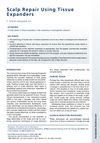 11 citations,
August 2013 in “Facial Plastic Surgery Clinics of North America”
11 citations,
August 2013 in “Facial Plastic Surgery Clinics of North America” Tissue expanders effectively repair large scalp defects and restore a natural-looking scalp.
 10 citations,
July 2001 in “Hair transplant forum international”
10 citations,
July 2001 in “Hair transplant forum international” The document's conclusion cannot be provided because the document is not readable or understandable.
 9 citations,
March 2023 in “Biomimetics”
9 citations,
March 2023 in “Biomimetics” New materials that better mimic natural skin structure could improve healing, especially for chronic wounds.
 9 citations,
April 2021 in “Frontiers in Immunology”
9 citations,
April 2021 in “Frontiers in Immunology” Unconventional lymphocytes are important for quick immune responses and healing of skin and mucosal barriers.
 9 citations,
February 2021 in “Frontiers in Cell and Developmental Biology”
9 citations,
February 2021 in “Frontiers in Cell and Developmental Biology” Older mice have stiffer skin with less elasticity due to changes in collagen and skin structure, affecting aging and hair loss.
 9 citations,
January 2018 in “Stem Cells International”
9 citations,
January 2018 in “Stem Cells International” Deer antler stem cell fluid helps regenerate tissue better than fat-derived stem cell fluid.
 9 citations,
September 2017 in “Nanoscale Research Letters”
9 citations,
September 2017 in “Nanoscale Research Letters” Graphene oxide helps deliver a skin healing agent over time, improving skin and hair follicle regeneration.
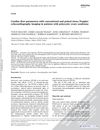 9 citations,
May 2010 in “Gynecological Endocrinology”
9 citations,
May 2010 in “Gynecological Endocrinology” Young women with PCOS and no other heart risk factors have normal heart function.
 8 citations,
April 2019 in “ACS Biomaterials Science & Engineering”
8 citations,
April 2019 in “ACS Biomaterials Science & Engineering” The new SIS-PEG sponge is a promising material for skin regeneration and hair growth.
 8 citations,
January 2018 in “PubMed”
8 citations,
January 2018 in “PubMed” Smaller finasteride particles increase effectiveness in treating hair loss.
8 citations,
July 2017 in “The journal of investigative dermatology/Journal of investigative dermatology” Certain microRNAs might help identify and understand Frontal Fibrosing Alopecia.
 7 citations,
February 2018 in “InTech eBooks”
7 citations,
February 2018 in “InTech eBooks” Biomaterials combined with stem cells show promise for improving tissue repair and medical treatments.
 7 citations,
March 2014 in “ISRN Biomaterials”
7 citations,
March 2014 in “ISRN Biomaterials” Keratin hydrogel from human hair helps rats recover better from spinal cord injuries.
 6 citations,
January 2023 in “npj regenerative medicine”
6 citations,
January 2023 in “npj regenerative medicine” Transplanting growing hair follicles into scars can help regenerate and improve scar tissue.
 6 citations,
October 2019 in “Jo'jig gonghag gwa jaesaeng uihag/Tissue engineering and regenerative medicine”
6 citations,
October 2019 in “Jo'jig gonghag gwa jaesaeng uihag/Tissue engineering and regenerative medicine” Rice bran extract boosts melanin production in hair follicles.
 6 citations,
September 1993 in “The Journal of Dermatologic Surgery and Oncology”
6 citations,
September 1993 in “The Journal of Dermatologic Surgery and Oncology” Using tissue adhesive in hair transplants improves results and patient satisfaction, with fewer complications.
5 citations,
May 2021 in “EMBO journal” Cell polarity signaling controls tissue mechanics and cell fate, with complex interactions and varying pathways across species.
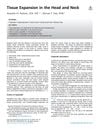 5 citations,
July 2019 in “Atlas of the Oral and Maxillofacial Surgery Clinics”
5 citations,
July 2019 in “Atlas of the Oral and Maxillofacial Surgery Clinics” Tissue expansion for head and neck reconstruction has good blood supply and doesn't need capsule removal, but expect temporary hair loss with normal growth resuming after 6-8 months.
5 citations,
October 2018 in “Journal of Cosmetic Dermatology” Oral pulse steroids reduce TNF-α levels, improving alopecia areata.
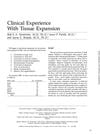 5 citations,
July 1988 in “Facial Plastic Surgery”
5 citations,
July 1988 in “Facial Plastic Surgery” Tissue expansion is a useful method for reconstructive surgery with good results and room for further enhancement.
 4 citations,
January 2022 in “Life”
4 citations,
January 2022 in “Life” Tissue engineering could be a future solution for hair loss, but it's currently expensive, complex, and hard to apply in real-world treatments.
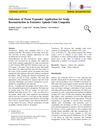 4 citations,
November 2015 in “Aesthetic Plastic Surgery”
4 citations,
November 2015 in “Aesthetic Plastic Surgery” Using tissue expanders for scalp reconstruction in patients with extensive Aplasia Cutis Congenita is effective and has minimal complications.
 4 citations,
October 2014 in “Journal of Integrative Agriculture”
4 citations,
October 2014 in “Journal of Integrative Agriculture” Researchers found 24 genes that change significantly and affect cashmere growth in goats; this could help increase cashmere production.
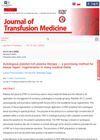 3 citations,
October 2020 in “Journal of Transfusion Medicine”
3 citations,
October 2020 in “Journal of Transfusion Medicine” Platelet-rich plasma therapy is seen as a promising tissue repair method but lacks standardized protocols.
 2 citations,
February 2024 in “Nature cell biology”
2 citations,
February 2024 in “Nature cell biology” Mechanical forces are crucial for shaping cells and forming tissues during development.
 2 citations,
May 2023 in “bioRxiv (Cold Spring Harbor Laboratory)”
2 citations,
May 2023 in “bioRxiv (Cold Spring Harbor Laboratory)” Stem cells help remove dead cells to keep tissues healthy by balancing cell replacement and clearance.
 2 citations,
March 2023 in “Annals of Translational Medicine”
2 citations,
March 2023 in “Annals of Translational Medicine” The analysis shows the U.S. leads in tissue expansion research, mainly for breast reconstruction, with a slightly higher complication rate when using acellular dermal matrix.



























